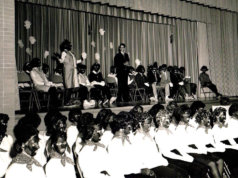Cecilia Robinson is the superintendent of Millwood Public Schools in Oklahoma County. She’s completing her third school year at what she describes as her “dream job.”
In this Q&A conducted over the phone, Robinson discusses her district’s early childhood-education efforts, bemoans Oklahoma’s teacher shortage and budget cuts, elaborates on the “digital divide” facing many high-poverty students and explains how children who lack “pre-literacy skills” quickly fall behind in reading levels.
The interview was edited for clarity and length.
What do most people not know about Millwood Public Schools?
The thing that actually surprises more people than it should is that we are our own independent school district. I get more questions about that than anything, after all these years. Millwood has been a school since 1951. It was an elementary school, and it became an independent school district in 1971 when it added a high school, and that is the same year it integrated as well. We’re 97 percent African-American (now), but it did not become that way until about 1980.
What is the biggest challenge facing Millwood Public Schools?
Our biggest challenge right now is just making sure our kids reach their full potential — so right now our biggest challenge is academic outcome; demonstrating that our kids can compete academically.
Over time, Millwood has progressively become more populated with children from free- and reduced-lunch homes. The level of poverty has risen, and so we know that when levels of poverty rises, the needs that children bring with them to school are generally beyond academic needs.
One of the things that we do is we partner with a local agency that provides counseling services to kids in school. We partner with Community Works to work with the classroom teachers and the families and the students to address whatever social and emotional needs they might be having, and that’s kind of our way of decreasing suspensions. We know sending kids home is not an answer.
We’ve also partnered with the Inasmuch Foundation, and through them we were able to totally redo our early childhood environment for pre-K and kindergarten. We’ve kind of flipped our classroom environment so they aren’t structured like small high school classrooms, but they are structured in a way that helps kids develop the social skills they’ll need to be successful as they grow up. Our hope is, as kids enter pre-K and kindergarten at Millwood, that they learn how to work together, how to solve problems, how to make friends, how to be dependable. They learn those things in preschool so that when they get into first grade we don’t have to go back and teach how to get along with each other. And that’s really hard because the higher the concentration of poverty, the less likely children are to go to preschool. So if elementary school or kindergarten is their first time in school, then teachers are having to teach lessons about how to work together rather than teach them pre-reading skills.
Tell us a little about your background and how you got into education? What drew you to Millwood?
I graduated from John Marshall High School. I left high school, went to Oklahoma State, and I wanted to be an administrator. And teaching is just what you have to do to be an administrator, so when I graduated from OSU, I went into teaching and jumped on the first chance I could to join a cohort with Oklahoma City Public Schools that trained administrators.
(My husband and I) moved to Hartford, Conn., and in Hartford when I got there, I was a certified administrator. I went right into administration after about four years of teachers. In Hartford, I was there for about seven years, and in that seven years, I was an elementary principal, a director of elementary math, and a middle school principal.
From there, my superintendent that hired me in Hartford ended up in Kansas City, so he called me to come work for him there, (where) I served as an area superintendent where I had 28 schools that answered to me. One of my specialties, if you will, in the cabinet was early childhood. So I handled Montessori, head start and state-funded preschool. If you know anything about school districts in the nation, Kansas City was probably one of the most troubled you could work at. I was there for three years and I had three superintendents.
I said if my dream job ever came back open, I’d move back home. (My friend) said, “What’s your dream job?” I said, “Millwood.” Well this was in July, and literally in January he called me and said (…) “Millwood is open.” So literally, I was their last applicant, and the very last application they took and their last interview, but I ended up getting the job. If I had not told my friend that I wanted to be at Millwood, I wouldn’t have known that it came open.
Much has been made about a “teacher shortage” in Oklahoma owing to lower compensation levels for educators than other states offer. Has this affected your district?
I have 57 teaching positions, and 13 of them were emergency certifications last year, so without emergency certs I would not have been fully staffed. Even right now, I have a music teacher vacancy and a high school librarian vacancy. I don’t have one application, and it’s been posted since January. But with the budget cuts right now, I wouldn’t hire the (positions). But I have them allocated for next year.
How have the recent budget cuts related to Oklahoma’s revenue failure been felt by your school?
It’s actually been pretty bad. The budget cuts alone were pretty bad, but the new motor-vehicle legislation that allowed for kind of an evenness of revenue, if you will, hit us pretty hard because we were a district that really benefited from motor-vehicle collections. So right now we’re in the process with other school districts of trying to figure out what kind of remedy we can seek because I don’t know why if I can collect more motor vehicle taxes from the 10-square-miles that our district sits in, why do we have to share it with other districts?
I’m not sure what the average cuts in the state have been per pupil, but from the spreadsheets I see, most schools have been cut a total of about $100 or $150 per pupil. Millwood has been cut $265 per child from the budget cuts and the motor-vehicle collections combined.
If U.S. Secretary of Education John King were standing in front of you today, what would you say? If he offered to grant you one wish, what would it be?
(I would wish for) more latitude with the federal dollars. More latitude with the federal dollars would be extremely helpful. The other one would be a closer look at E-Rate, because when you serve a district with high needs, you have what you call a digital divide where you have kids who don’t have access to wireless, or computers or technology in their homes. So we are raising a generation, obviously, that has to be computer literate in order to compete, and E-Rate has gone through a bunch of reauthorizations where they’ve started to spread that money thin as well, but when you service high-needs (populations), if those kids don’t get that access at school, where are they going to get it? So you raise generations of kids who are going into a future that’s all going to be computerized, and we can’t help them compete.
If you weren’t in education, what might you be doing today?
My staff laughs at me because I think I’m like a junior attorney. You know, I don’t really need to call the lawyers? I can handle this. So I’d definitely be a lawyer. One of the things that happens all the time in education no matter where you are, parents get frustrated, they say they’re going to call a lawyer. Apparently, that used to rattle (my staff). I say, ‘I don’t care. I know the law. I know what I can do, and I know what I can’t do.’
We have an Oklahoma County sheriff (deputy) on our campus, and even with them, they’re always amazed at how much I know the law. They joke with me about it. They say, even before we call someone else, we’re going to ask our in-house district attorney, and that’s me.






















